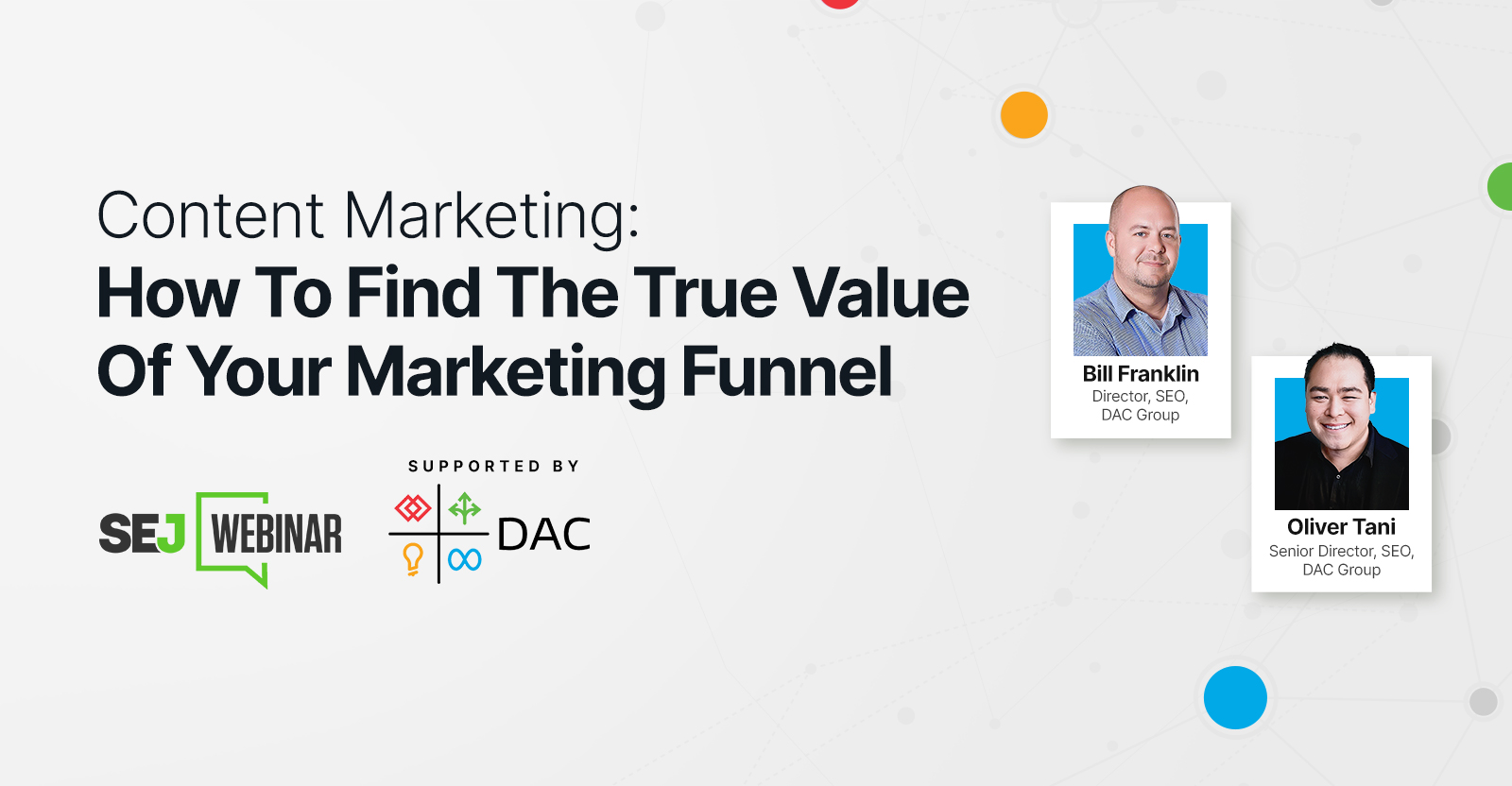SEO
Truly Outrageous SEO Predictions for 2023 and Beyond

The pandemic aside, Google has taken us through a pretty wild ride since 2020 to today and there are tons of predictions of what could happen in 2023 and beyond. Some people talk about AI writing and other ways to make SEO more efficient but here’s what I really think would happen next year and beyond.
1. A.I.milar Content will run Amok and Get De-valued
AI or artificial intelligence may be the darling acronym of silicon valley but it’s not something that Google is happy for us mortal SEO people to be using for rankings.
I literally used the word Aimilar rather than similar because AI written content will generally look similar to Google for the most part. AI is still quite limited in its out-of-the-box thinking. After all, it’s supposed to think within parameters and is not a sentient being.
So the results of AI written content will generally be sounding quite similar with each other – which means that if your content writing team will not do their due diligence and really put some humanity, art and creativity to the AI written content by doing the final edits – you’re screwed.
I’ve seen some reports of AI generated content not ranking well at all.
And yet this is what a lot of SEO companies out there are using now and they are selling this to their clients without the clients realizing that the content other SEO companies out there are producing are just AI generated content!
It’s brilliant but at the same time, sly and outrageous!
We already have too much content being produced at the fastest amount of time since known history – and this is going to accelerate it even further – and make a lot of content on the web trashier at the same time.
Which means that there would be a lot of companies out there who are oblivious to their SEO agencies doing this to them that would suddenly rank lower. Remember, Google’s AI is not sentient but it’s not dumb either. Since it’s a big-data learning algorithm, it would surely pick up on what is AI generated content and what is not.
This is why I make sure that our team at SEO Hacker always has brilliant, creative writers AND editors for all the work we put out there.
2. Top 3 Ranking Websites will Fluctuate in and out
Google exists to make lots of making money. That’s a fact. It does exist for other aspirational things but as of now, it is a money behemoth and it needs to keep being a money behemoth or it will get into trouble.
So what I believe would happen next year is the top 3 spots for a lot of industries would be unstably fluctuating.
We can argue that Google’s AI might just be trying to test whether the lower ranking websites would get better click-through rates and website engagement time from the users. But it would also largely push these top ranking websites to bid on Google ads just for the stability of their first-page visibility on Google.
This means that the moat against competition in Google’s organic search listings would be even thinner for those who are ranking at the top. Unless you are the undeniable champion without a near 2nd challenger against your brand, you will probably have to get out of ‘cruise mode‘ and work on your SEO with an all-hands-on-deck attitude to keep your sweet rankings.
We have already seen Google shrink the organic search results time and again. It used to be 10 across the board but not we are seeing less and less of the organic results for some search terms. Some keywords would even only produce as few as 5 organic search results.
Then these keywords that are waylaid in their organic search results will see more sponsored ad listings in their page. I could almost imagine 5 to 6 sponsored ads would pepper the page in the organic listing’s stead.
The reason behind this is a very probable change is that Google is getting better and better in understanding what the user’s intention it. It’s almost scary – they can triangulate data outside of the search box.
So they know who you are (at least as an IP address or your mobile’s serial – or some qualified identifier), and they could see what you’re doing if you’re using Chrome browser (which is almost always the case), and they could see what you’re searching for, and they could hear from your Google home devices what your interests are.
In short, it would be way easier for Google to serve you what you are really looking for in a better way and a faster amount of time.
So there would come a time that we don’t even need 10 results to choose from in the first page (heck most of us don’t even look at the 5th to 10th result anymore!) And Google will be free to serve only 5 organic search results and the rest would be sponsored ads or other extensions or advanced listings.
4. Link Entropy will be More Felt
Yes link rot is also real but it’s also a damn shame if your website is suffering from link rot. This means that you didn’t get your 301 redirects right or your new website wasn’t able to retain or rebuild certain key pages that had links pointing to them.
But link rot has been covered before – it’s not a new thing.
What’s new now is link entropy.
I have noticed that over-time, older links that were published for 5 to 10 years ago loses their authority even if the website where the link is coming from is gaining better domain authority – which means the site is still healthy and is still getting a good number of new links coming in.
It’s not really talked about and there are no decisive studies made on this yet but hey, this is a prediction post, not a scientific paper.
If you are not making an effort to build new, better links every week or every month, you will not be helping your rankings get better. This also connects to my 2nd point where the moat will get thinner. Competitors who are continuously building on their backlinks will be able to overtake companies who have left their SEO in the dust faster.
This makes the organic search listings even more volatile, competitive and it would consequently drive the price to do great SEO higher. Which would largely make companies think if they would rather stick to SEM instead of venture to doing SEO. This would obviously favor Google’s revenues long-term.
5. Voice Search Will Still not be a Thing
Yes I have seen my share of SEO predictions that say that voice search would be a thing. I might have even believed it once.
But now years into this prediction and it’s still not a thing.
So no, I think voice search will still not be a thing for 2023 and beyond. SEO specialists will still focus on written-word SEO.
There are many more SEO predictions in my head as I write this down but it would take some rummaging and polishing for me to be able to share them with you clearly.
I hope you enjoyed at least some of my predictions here. If something resonates with you, I’d love to know and hear from you in the comments section below!
SEO
Measuring Content Impact Across The Customer Journey

Understanding the impact of your content at every touchpoint of the customer journey is essential – but that’s easier said than done. From attracting potential leads to nurturing them into loyal customers, there are many touchpoints to look into.
So how do you identify and take advantage of these opportunities for growth?
Watch this on-demand webinar and learn a comprehensive approach for measuring the value of your content initiatives, so you can optimize resource allocation for maximum impact.
You’ll learn:
- Fresh methods for measuring your content’s impact.
- Fascinating insights using first-touch attribution, and how it differs from the usual last-touch perspective.
- Ways to persuade decision-makers to invest in more content by showcasing its value convincingly.
With Bill Franklin and Oliver Tani of DAC Group, we unravel the nuances of attribution modeling, emphasizing the significance of layering first-touch and last-touch attribution within your measurement strategy.
Check out these insights to help you craft compelling content tailored to each stage, using an approach rooted in first-hand experience to ensure your content resonates.
Whether you’re a seasoned marketer or new to content measurement, this webinar promises valuable insights and actionable tactics to elevate your SEO game and optimize your content initiatives for success.
View the slides below or check out the full webinar for all the details.
SEO
How to Find and Use Competitor Keywords

Competitor keywords are the keywords your rivals rank for in Google’s search results. They may rank organically or pay for Google Ads to rank in the paid results.
Knowing your competitors’ keywords is the easiest form of keyword research. If your competitors rank for or target particular keywords, it might be worth it for you to target them, too.
There is no way to see your competitors’ keywords without a tool like Ahrefs, which has a database of keywords and the sites that rank for them. As far as we know, Ahrefs has the biggest database of these keywords.
How to find all the keywords your competitor ranks for
- Go to Ahrefs’ Site Explorer
- Enter your competitor’s domain
- Go to the Organic keywords report
The report is sorted by traffic to show you the keywords sending your competitor the most visits. For example, Mailchimp gets most of its organic traffic from the keyword “mailchimp.”


Since you’re unlikely to rank for your competitor’s brand, you might want to exclude branded keywords from the report. You can do this by adding a Keyword > Doesn’t contain filter. In this example, we’ll filter out keywords containing “mailchimp” or any potential misspellings:


If you’re a new brand competing with one that’s established, you might also want to look for popular low-difficulty keywords. You can do this by setting the Volume filter to a minimum of 500 and the KD filter to a maximum of 10.


How to find keywords your competitor ranks for, but you don’t
- Go to Competitive Analysis
- Enter your domain in the This target doesn’t rank for section
- Enter your competitor’s domain in the But these competitors do section


Hit “Show keyword opportunities,” and you’ll see all the keywords your competitor ranks for, but you don’t.


You can also add a Volume and KD filter to find popular, low-difficulty keywords in this report.


How to find keywords multiple competitors rank for, but you don’t
- Go to Competitive Analysis
- Enter your domain in the This target doesn’t rank for section
- Enter the domains of multiple competitors in the But these competitors do section


You’ll see all the keywords that at least one of these competitors ranks for, but you don’t.


You can also narrow the list down to keywords that all competitors rank for. Click on the Competitors’ positions filter and choose All 3 competitors:


- Go to Ahrefs’ Site Explorer
- Enter your competitor’s domain
- Go to the Paid keywords report


This report shows you the keywords your competitors are targeting via Google Ads.
Since your competitor is paying for traffic from these keywords, it may indicate that they’re profitable for them—and could be for you, too.
You know what keywords your competitors are ranking for or bidding on. But what do you do with them? There are basically three options.
1. Create pages to target these keywords
You can only rank for keywords if you have content about them. So, the most straightforward thing you can do for competitors’ keywords you want to rank for is to create pages to target them.
However, before you do this, it’s worth clustering your competitor’s keywords by Parent Topic. This will group keywords that mean the same or similar things so you can target them all with one page.
Here’s how to do that:
- Export your competitor’s keywords, either from the Organic Keywords or Content Gap report
- Paste them into Keywords Explorer
- Click the “Clusters by Parent Topic” tab


For example, MailChimp ranks for keywords like “what is digital marketing” and “digital marketing definition.” These and many others get clustered under the Parent Topic of “digital marketing” because people searching for them are all looking for the same thing: a definition of digital marketing. You only need to create one page to potentially rank for all these keywords.


2. Optimize existing content by filling subtopics
You don’t always need to create new content to rank for competitors’ keywords. Sometimes, you can optimize the content you already have to rank for them.
How do you know which keywords you can do this for? Try this:
- Export your competitor’s keywords
- Paste them into Keywords Explorer
- Click the “Clusters by Parent Topic” tab
- Look for Parent Topics you already have content about
For example, if we analyze our competitor, we can see that seven keywords they rank for fall under the Parent Topic of “press release template.”


If we search our site, we see that we already have a page about this topic.


If we click the caret and check the keywords in the cluster, we see keywords like “press release example” and “press release format.”


To rank for the keywords in the cluster, we can probably optimize the page we already have by adding sections about the subtopics of “press release examples” and “press release format.”
3. Target these keywords with Google Ads
Paid keywords are the simplest—look through the report and see if there are any relevant keywords you might want to target, too.
For example, Mailchimp is bidding for the keyword “how to create a newsletter.”


If you’re ConvertKit, you may also want to target this keyword since it’s relevant.
If you decide to target the same keyword via Google Ads, you can hover over the magnifying glass to see the ads your competitor is using.


You can also see the landing page your competitor directs ad traffic to under the URL column.


Learn more
Check out more tutorials on how to do competitor keyword analysis:
SEO
Google Confirms Links Are Not That Important

Google’s Gary Illyes confirmed at a recent search marketing conference that Google needs very few links, adding to the growing body of evidence that publishers need to focus on other factors. Gary tweeted confirmation that he indeed say those words.
Background Of Links For Ranking
Links were discovered in the late 1990’s to be a good signal for search engines to use for validating how authoritative a website is and then Google discovered soon after that anchor text could be used to provide semantic signals about what a webpage was about.
One of the most important research papers was Authoritative Sources in a Hyperlinked Environment by Jon M. Kleinberg, published around 1998 (link to research paper at the end of the article). The main discovery of this research paper is that there is too many web pages and there was no objective way to filter search results for quality in order to rank web pages for a subjective idea of relevance.
The author of the research paper discovered that links could be used as an objective filter for authoritativeness.
Kleinberg wrote:
“To provide effective search methods under these conditions, one needs a way to filter, from among a huge collection of relevant pages, a small set of the most “authoritative” or ‘definitive’ ones.”
This is the most influential research paper on links because it kick-started more research on ways to use links beyond as an authority metric but as a subjective metric for relevance.
Objective is something factual. Subjective is something that’s closer to an opinion. The founders of Google discovered how to use the subjective opinions of the Internet as a relevance metric for what to rank in the search results.
What Larry Page and Sergey Brin discovered and shared in their research paper (The Anatomy of a Large-Scale Hypertextual Web Search Engine – link at end of this article) was that it was possible to harness the power of anchor text to determine the subjective opinion of relevance from actual humans. It was essentially crowdsourcing the opinions of millions of website expressed through the link structure between each webpage.
What Did Gary Illyes Say About Links In 2024?
At a recent search conference in Bulgaria, Google’s Gary Illyes made a comment about how Google doesn’t really need that many links and how Google has made links less important.
Patrick Stox tweeted about what he heard at the search conference:
” ‘We need very few links to rank pages… Over the years we’ve made links less important.’ @methode #serpconf2024″
Google’s Gary Illyes tweeted a confirmation of that statement:
“I shouldn’t have said that… I definitely shouldn’t have said that”
Why Links Matter Less
The initial state of anchor text when Google first used links for ranking purposes was absolutely non-spammy, which is why it was so useful. Hyperlinks were primarily used as a way to send traffic from one website to another website.
But by 2004 or 2005 Google was using statistical analysis to detect manipulated links, then around 2004 “powered-by” links in website footers stopped passing anchor text value, and by 2006 links close to the words “advertising” stopped passing link value, links from directories stopped passing ranking value and by 2012 Google deployed a massive link algorithm called Penguin that destroyed the rankings of likely millions of websites, many of which were using guest posting.
The link signal eventually became so bad that Google decided in 2019 to selectively use nofollow links for ranking purposes. Google’s Gary Illyes confirmed that the change to nofollow was made because of the link signal.
Google Explicitly Confirms That Links Matter Less
In 2023 Google’s Gary Illyes shared at a PubCon Austin that links were not even in the top 3 of ranking factors. Then in March 2024, coinciding with the March 2024 Core Algorithm Update, Google updated their spam policies documentation to downplay the importance of links for ranking purposes.
The documentation previously said:
“Google uses links as an important factor in determining the relevancy of web pages.”
The update to the documentation that mentioned links was updated to remove the word important.
Links are not just listed as just another factor:
“Google uses links as a factor in determining the relevancy of web pages.”
At the beginning of April Google’s John Mueller advised that there are more useful SEO activities to engage on than links.
Mueller explained:
“There are more important things for websites nowadays, and over-focusing on links will often result in you wasting your time doing things that don’t make your website better overall”
Finally, Gary Illyes explicitly said that Google needs very few links to rank webpages and confirmed it.
I shouldn’t have said that… I definitely shouldn’t have said that
— Gary 鯨理/경리 Illyes (so official, trust me) (@methode) April 19, 2024
Why Google Doesn’t Need Links
The reason why Google doesn’t need many links is likely because of the extent of AI and natural language undertanding that Google uses in their algorithms. Google must be highly confident in its algorithm to be able to explicitly say that they don’t need it.
Way back when Google implemented the nofollow into the algorithm there were many link builders who sold comment spam links who continued to lie that comment spam still worked. As someone who started link building at the very beginning of modern SEO (I was the moderator of the link building forum at the #1 SEO forum of that time), I can say with confidence that links have stopped playing much of a role in rankings beginning several years ago, which is why I stopped about five or six years ago.
Read the research papers
Authoritative Sources in a Hyperlinked Environment – Jon M. Kleinberg (PDF)
The Anatomy of a Large-Scale Hypertextual Web Search Engine
Featured Image by Shutterstock/RYO Alexandre
-

 PPC4 days ago
PPC4 days ago19 Best SEO Tools in 2024 (For Every Use Case)
-

 MARKETING7 days ago
MARKETING7 days agoWill Google Buy HubSpot? | Content Marketing Institute
-
SEARCHENGINES7 days ago
Daily Search Forum Recap: April 16, 2024
-

 SEO6 days ago
SEO6 days agoGoogle Clarifies Vacation Rental Structured Data
-

 MARKETING6 days ago
MARKETING6 days agoStreamlining Processes for Increased Efficiency and Results
-
SEARCHENGINES5 days ago
Daily Search Forum Recap: April 17, 2024
-

 PPC7 days ago
PPC7 days agoHow to Collect & Use Customer Data the Right (& Ethical) Way
-

 SEO6 days ago
SEO6 days agoAn In-Depth Guide And Best Practices For Mobile SEO
















You must be logged in to post a comment Login